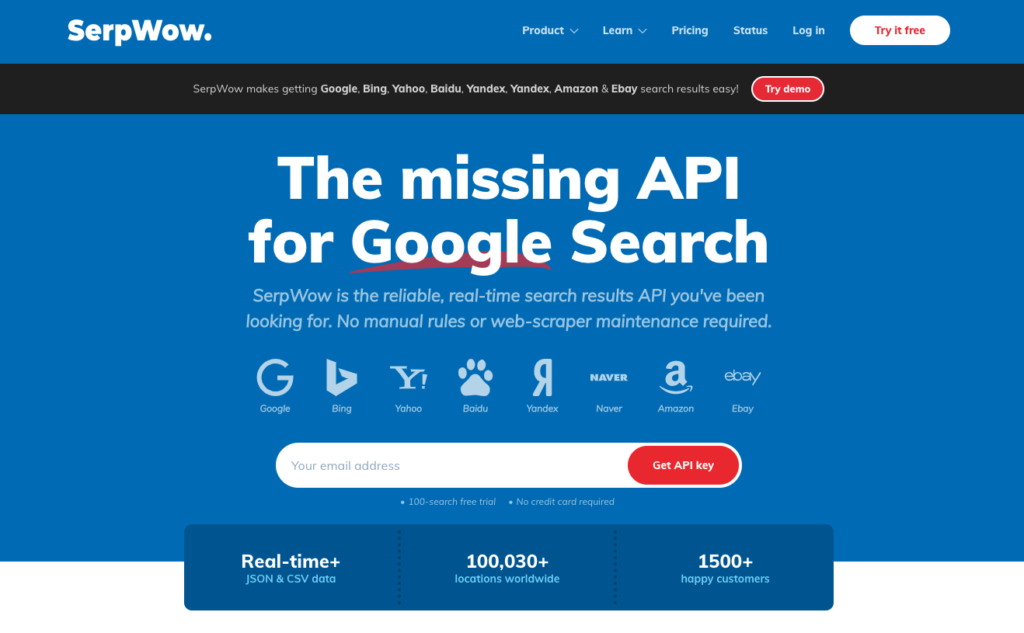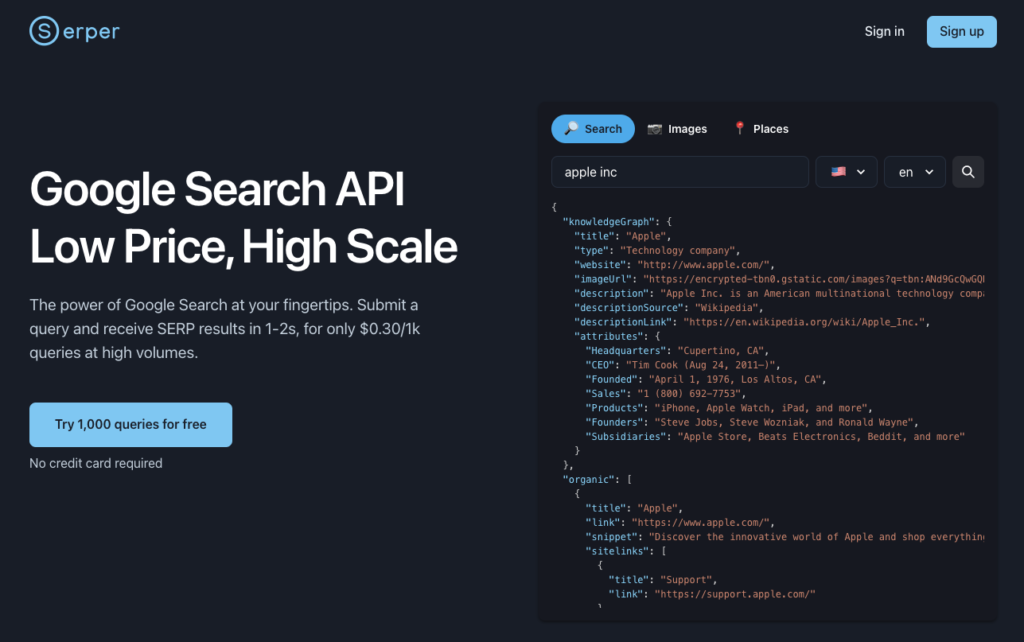Top SEO APIs For 2024: Unlock Insights & Automation!
Are you ready to supercharge your Search Engine Optimization (SEO) efforts with the power of data and automation? The integration of SEO APIs is revolutionizing the way businesses approach online visibility, offering unprecedented access to critical information and the ability to execute complex SEO strategies with remarkable efficiency.
The digital landscape is constantly evolving, and staying ahead of the curve requires more than just intuition. Today's SEO professionals need a comprehensive understanding of their online presence, their competitors, and the search engine algorithms that govern visibility. APIs, or Application Programming Interfaces, are the key to unlocking this wealth of knowledge, offering programmatic access to data that was once only available through manual research or expensive subscription services.
With the right SEO API stack, the possibilities for automating SEO strategy, auditing, and reporting are virtually endless. From keyword research and backlink analysis to technical SEO audits and content optimization, APIs can streamline and enhance nearly every aspect of your SEO workflow. This allows you to make data-driven decisions, optimize your efforts, and achieve better results in less time.
Before diving into the world of SEO APIs, it's important to understand what they are and how they can benefit your specific needs. SEO APIs are essentially software interfaces that allow developers to access and manipulate data from search engines and other SEO tools. They provide a means to automate and streamline tasks such as keyword research, link building, competitor analysis, and rank tracking. APIs empower users to build custom SEO tools, dashboards, and integrations tailored to their unique requirements.
| Category | Details |
|---|---|
| Definition | Software interfaces providing access and manipulation of data from search engines and SEO tools. |
| Purpose | To automate and streamline SEO tasks like keyword research, link building, competitor analysis, and rank tracking. |
| Benefits |
|
| Examples of Tasks |
|
| Key Functionalities | Keyword research, backlink analysis, rank tracking, content optimization, technical SEO auditing. |
| Access & Usage | Programmatic access to data, enabling custom tool creation. |
| Value Proposition | Connectivity, automation, and data access for enhanced SEO strategies. |
| Tools and Integrations | Moz API, Semrush API, Ahrefs, Seobility API. |
| Accessibility | API documentation is often available for easy integration. |
| Cost considerations | Balancing between the cost and value of free and paid options. |
One of the initial considerations when selecting an SEO API is cost. Many providers offer different pricing tiers, including free plans and paid subscriptions. For instance, some APIs have a basic free plan with a limited number of requests per month, with charges for additional requests. Others offer pro plans with a higher quota of monthly requests for a set fee. Deciding between free and paid options boils down to balancing cost and value. Free SEO APIs provide a good, but limited, entry point, while paid options often offer more robust features and higher request limits.
The free SEO API landscape is an attractive starting point. Tools like Zenserp, developed by Christoph Leitner, offer various functionalities without any upfront cost. However, remember that free plans often come with limitations, such as a restricted number of monthly requests. As your needs grow, you might need to transition to a paid plan to unlock more features and data.
Choosing the right SEO API requires careful consideration. Identify the specific SEO functionalities you require, whether its keyword research, backlink analysis, or rank tracking. Select an API that caters to your needs. Look at factors like the amount of data available, the ease of use, and the cost. Some APIs focus on specific areas, like content analysis or site audits. Others offer a broader suite of tools.
There are several factors to consider when selecting the best SEO API for your requirements. Think about the functionalities you need, like keyword research, backlink analysis, or rank tracking. You'll want an API that offers access to the data you need and fits your budget. Examine the API's documentation, the ease of integration, and the support offered by the provider.
For those focusing on keyword research, Google Keyword Planner remains a reliable free resource. It's accessible within Google Ads and allows for the creation of a solid content marketing strategy. Another valuable tool is a free tool that lets you easily mock up API endpoints and mock databases and make requests using a restful interface. This makes it easy to test the features of your chosen API.
APIs are used for a variety of marketing tasks including keyword research, competitive analysis, website traffic, and analyzing search engine results pages (SERPs). They enable tasks that formerly involved manual research or expensive subscriptions. With the right SEO API stack, automating your SEO strategy, auditing, and reporting can be done quickly and efficiently.
One of the most effective approaches is to leverage the power of SEO APIs to gather insights. Tools like Semrush's API offer quick access to insights into competitors digital marketing activities, allowing users to view data in various ways without accessing the user interface. This helps you to gain a competitive advantage. The right APIs can also help with website crawling and log analysis.
For many, the allure of a free SEO API is strong. Free SEO apis offer you a good, but limited, entry point for seo insights. However, these often come with limitations. The best free SEO API on the market might be scraping robots public SEO API. This can be a great choice if you want to use an API web scraper. Rather than building an SEO API, you can just use scraping robots public SEO API.
The Seobility API is another option, providing SEO data like site audits, backlinks, and rankings for easy integration into your software. With tools like Moz API, you can quickly create custom SEO tools, dashboards, and integrations. The API provides developers with the ability to build robust tools and applications that run off the same keyword data and API used by leading keyword tools.
Never compromise on speed: API requests sent to Serpstack are processed in a matter of milliseconds. An extensive API documentation is waiting to be explored and to get you started within just a few minutes. The search volume returned by keyword tool API exactly matches the numbers in Google Keyword Planner and Bing Keyword Planner. A single API request can return search volume data for 1,000 keywords. It means you can get data for a long list of keywords quickly.
The SEO Content Analysis API is an excellent choice if you want to gain insights into a website's content. Seoptimer is a free SEO audit tool that will perform a detailed SEO analysis across 100 website data points. Another option is to explore the top SEO APIs and discover how to harness their power for keyword research, rank tracking, technical SEO audits, content optimization, and more. With ahrefs in your corner, you can unlock some seriously cool functionalities. With the right SEO API stack, the possibilities for how you can automate SEO strategy, auditing, and reporting are endless.
The integration of SEO APIs allows for programmatic access to create, update, and extract data from thousands of SEO projects. Dataforseo account panel comes with a set of free cost management tools that will help you monitor your usage and spending, control your budgets, set limits, and more. APIs in SEO are about connectivity, automation, and data access.
One question that frequently arises is, "Do I need to be a developer to use SEO APIs?" The answer is no. You do not need to be a developer to use SEO APIs, but some technical skills may be helpful. However, many APIs offer user-friendly interfaces and documentation, making them accessible even to those with limited programming experience. A basic understanding of how APIs work and the ability to follow instructions is often sufficient to start using these tools.
Ultimately, the best SEO API for you will depend on your specific needs, technical skills, and budget. By carefully evaluating the options and considering the key factors discussed, you can select the right API to unlock the power of data and automation, propelling your SEO efforts to new heights. The key is to find the balance between cost and value. Remember, the world of SEO APIs is vast, and the right choice can significantly impact your online visibility and success.


